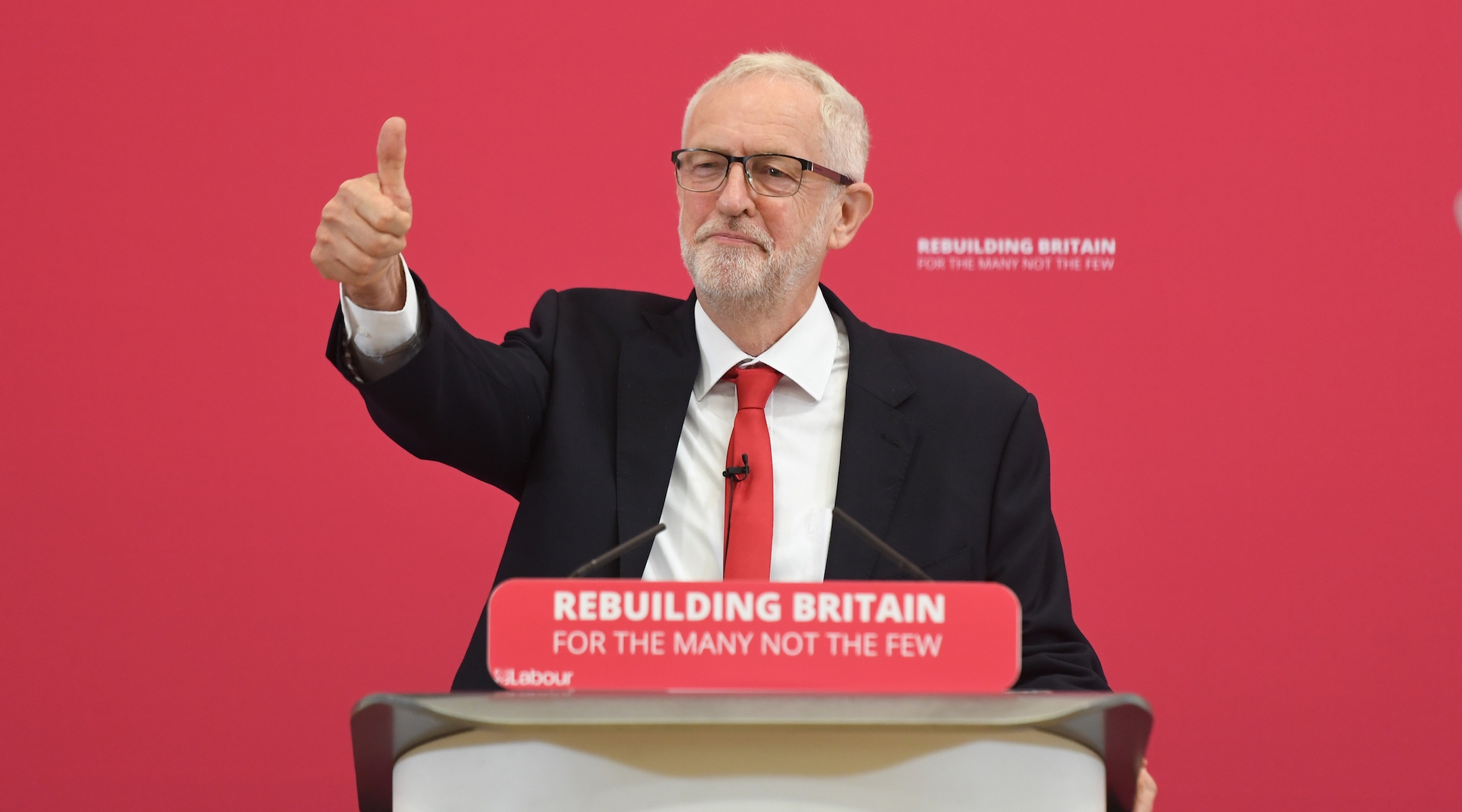(JTA) — In the United States, many felt a line had been crossed when President Donald Trump asserted that it’s “disloyal” for Jews to vote for Democrats because the party has lawmakers who have used anti-Semitic and anti-Israel rhetoric.
His remarks Tuesday and Wednesday on this theme prompted an avalanche of condemnations from Jewish organizations, many of whom said Trump had invoked anti-Semitic tropes about dual loyalty. Some critics were especially incensed when the president clarified that Jews who vote for Democrats are “being disloyal to Jewish people” and “disloyal to Israel” — as if he could presume to tell them how “good” Jews vote.
But for Jews in Britain, this discussion was nothing new. There, the growth of anti-Semitism in the left-wing Labour Party introduced years ago discussions on whether Jews who support it are betraying themselves and their coreligionists.
To be sure, it is off base to equate or compare the explosion of anti-Semitism within Labour under Jeremy Corbyn to its alleged expressions within the Democratic Party. Trump and other Republicans have focused on two freshman House Democrats, Ilhan Omar of Minnesota and Rashida Tlaib of Michigan, who support the boycott Israel movement and have been accused of using anti-Semitic tropes. But the Democratic-led House overwhelmingly passed resolutions denouncing anti-Semitic rhetoric like Omar’s and rejecting the boycott.
By contrast, Corbyn, a far-left politician who was elected to lead Labour in 2015, is himself accused of promoting anti-Semitism, though he denies this. A British watchdog group, in a digital dossier that ran to 15,000 pages, documented hundreds of Labour members and officials promoting anti-Semitic views.
Many critics say Corbyn has instituted a laissez-faire attitude toward anti-Israel rhetoric that spills over to classic anti-Semitism. Numerous lawmakers have quit the party in disgust.
British Jewry’s leaders, including former chief rabbi Jonathan Sacks, said it would be an “existential threat” to their community were Corbyn to come to power. In a recent poll, 85 percent of British Jewish respondents said Corbyn is anti-Semitic.
By contrast, over 75 percent of American Jews voted for Democrats in the 2018 elections. Despite the emergence in its radical fringes of anti-Israel — and some say anti-Jewish — rhetoric, the vast majority of Democratic lawmakers in the House and Senate staunchly support Israel, even if they are more likely than their Republican counterparts to disagree with its current government.
Still, British Jews understand better than most that the growth of anti-Semitism on the left is a “problem” and that American Jews “should not be complacent about it,” according to David Hirsh, a senior lecturer at Goldsmiths, University of London and an expert on left-wing anti-Semitism.
Corbyn for years had been a backbench outlier inside the Labour party, Hirsh noted. When he hosted Hamas and Hezbollah officials in parliament in 2009 and called them his friends, for example, he was dismissed as an entrenched radical with views so extreme they could never become influential within Labour, which was then still the political home for most British Jews.
When Corbyn defended an anti-Semitic London mural in 2013, British media was so indifferent to what many regarded as his contrarianism that it was barely reported. But Corbyn arguably has made this worldview party policy after becoming its leader thanks to a combination of factors, including a polarizing debate about globalization and Britain’s relationship with Europe.
“In Labour, Corbyn wasn’t in charge, and that’s the analogy,” Hirsh said, meaning the prominence of first-term lawmakers Omar and Tlaib. “The point is not that this phenomenon appeared on the fringe, but that we should not let it become mainstream.”
The mainstreaming of anti-Semitic rhetoric within Labour’s ranks ushered in a debate within the Jewish community and beyond on whether it was ethical, sensible and — yes — loyal for Jews to continue to support Labour.
The Conservative cabinet minister Sajid Javid angered some Jews when, in a Rosh Hashanah greeting last year, wrote that when British Jews are feeling under threat from Corbyn, “all decent people” must “stand together and celebrate our Jewish community.” To critics, the implication was that Jews who support Labour aren’t decent.
Others have been more explicit. Fred Dalah, a 64-year-old Jewish businessman from Edgware in northern London, wrote in 2018 in the Jewish News of London that, “Jews who vote Labour are lambs to the slaughter.”
In addition to Sacks, the president of the Board of Deputies of British Jews and three of the leading British Jewish newspapers have called Corbyn an existential threat to British Jewry. These warnings were designed to sound an alarm and prevent Corbyn from becoming prime minister. But they also emboldened British Jews and non-Jews to call out Jewish supporters of Corbyn as traitors.
At the same time, Corbyn’s supporters cite these loud warnings as a political attempt to weaponize anti-Semitism and sabotage a left-wing politician’s chances.
All this means that, in Britain, “Now you have the situation where there is good Jews, bad Jews, and good anti-Semites and bad anti-Semites,” said Dave Rich, head of policy at the Community Security Trust and author of a 2016 book, “The Left’s Jewish Problem: Jeremy Corbyn, Israel and Anti-Semitism,” during a speech in 2018. “I don’t think this is really going to work.”
JTA has documented Jewish history in real-time for over a century. Keep our journalism strong by joining us in supporting independent, award-winning reporting.






